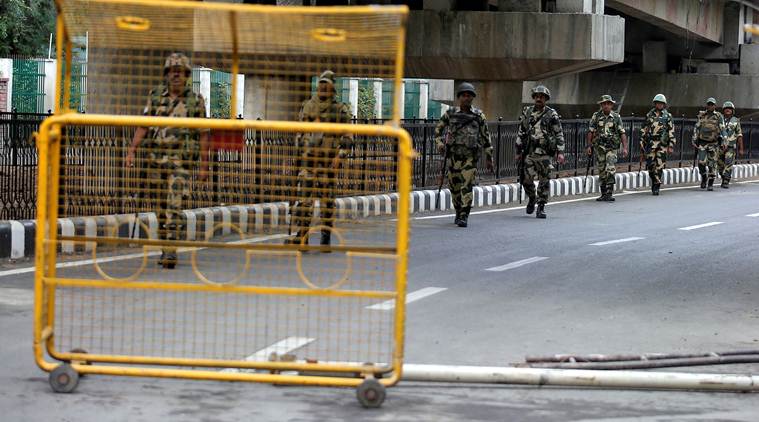
On August 5, district magistrates invoked Section 144 CrPC and imposed restrictions on movement and public gatherings. (REUTERS/Danish Ismail)
Jammu and Kashmir was closed down on the evening of August 4, 2019. The assault on human rights began that night. The new team that had taken over — the Governor, advisors, the Chief Secretary, the Director-General of Police etc — had scant respect for the Constitution of India.
On August 4, 2019, mobile phone networks, Internet services and landline connectivity were discontinued in the Kashmir Valley. Restrictions on movement were imposed. On August 5, 2019, Constitutional Order 272 was issued by the President stripping J&K of its special status and applying all the provisions of the Constitution of India to the proposed Union Territories. On the same day, district magistrates invoked Section 144 CrPC and imposed restrictions on movement and public gatherings. Hundreds of political leaders and activists were detained. Three former chief ministers were detained— and are still in custody — without charges.
Ms Anuradha Bhasin, Executive Editor of Kashmir Times, Mr Ghulam Nabi Azad, MP, and others challenged these restrictions in the Supreme Court. Apart from the contention that the fundamental rights of the petitioners had been breached, Ms Bhasin contended she was unable to publish her newspaper and freedom of press had been contravened.
On September 16, 2019, the Supreme Court ordered that the state government “keeping in mind the national interest and internal security shall make all endeavours to ensure that normal life is restored in Kashmir”. As feared, normal life was not restored. On October 10, 2019, the Court recorded the submission of the Central government that some restrictions “have been relaxed”. Effectively, however, there was no interim order that the Central and state governments were obliged to comply with, and the conditions in J&K, particularly in the Kashmir Valley, remained the same.
Issues and answers
The cases were heard on several days, judgment was reserved on November 27, 2019, and pronounced on January 10, 2020.
The Court had framed five issues. Let me give a snapshot of the issues and the answers given by the Court:
1. Can the government claim exemption from producing the orders under Section 144 CrPC?
Ans: NO
2. Are freedom of speech and freedom to carry on business over the Internet fundamental rights?
Ans: YES, under Article 19(1)(a) and (g), respectively, and every order suspending Internet shall be reviewed within 7 days (and periodically within 7 days of the previous review).
3. Is access to Internet a fundamental right?
Not answered.
4. Whether the restrictions under Section 144 were valid?
Ans: After stating that the power is preventive and remedial, that the order must balance the rights and restrictions based on the principle of proportionality and that repetitive orders cannot be passed, the Court directed the state/authorities “to review forthwith the need for continuance of the orders”.
5. Whether freedom of press was violated?
Ans: After examining the doctrine of “chilling effect”, and considering that the newspaper had resumed publication, the Court held “we do not deem it fit to indulge more in the issue than to state that responsible governments are required to respect the freedom of the press at all times”.
Striking a balance
The findings of the Court — and the reluctance to render findings on some issues — were not surprising. At the very beginning of the judgment, the Court had made its approach clear: “Our limited scope is to strike a balance between the liberty and security concerns … we are here only to ensure that citizens are provided all the rights and liberty to the highest extent in a given situation while ensuring security at the same time.”
During the period from August 4, 2019, to January 13, 2020, when the government was maintaining so-called ‘normalcy’, 20 civilians and 36 militants were killed and eight security personnel lost their lives.
As you read this column, restrictions continue on Internet, on movement, on public gatherings, on political activities, on speech and writing, and on visitors to the Valley. Political leaders continue to be in custody without charges. So, has anything really changed after the judgment?
Benjamin Franklin said “Those who would give up essential Liberty, to purchase a little temporary Safety, deserve neither Liberty nor Safety”. The context was different; nevertheless that quote has become a classic whenever there is a conflict between liberty and security. Would the conclusions have been different if the Court had kept as its guiding principle the dictum of Benjamin Franklin?
Will anything change?
The Court’s judgment gives the government a way to retreat from its authoritarian and militaristic approach to the Kashmir issue — but I doubt the government will take that route. The judgment also gives hope to the seven million people of the Kashmir Valley that their freedoms will be restored — although there is no sign yet of that happening seven days later.
The Respondents (Central and the Union Territory governments) are unhappy that their actions will constantly be subject to judicial review. The Petitioners are unhappy that they have got no real relief, only propositions of law.
More could have been done by the Court, as in the Privacy case (Justice Puttaswamy). An opportunity was lost. Maybe more will be done at the next hearing of the case (you bet there will be an action for contempt) or at the hearing of the next case. Sometimes, the law
can disappoint.
